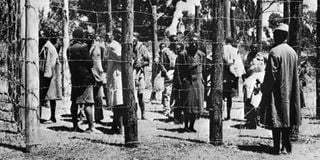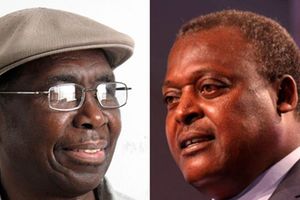Premium
Colonial propaganda of profiling ‘others’ has vandalised our moral compass

Suspected Mau Mau fighters in a reserve during the Mau Mau uprising against British colonial rule in Kenya in this photo taken in October 1952. The colonial tendency to profile people according to their tribes persists to this day.
What you need to know:
- William Ruto has had to endure rabid denunciation, animated by the visceral of his rivals hell-bent on grounding him politically.
- The Gikuyu and Ruto share the unfortunate, colonial and neocolonial burden of being called thieves by people who lack shame and a sense of irony.
It is obvious that colonialism was an atrocious enterprise founded on robbery, theft, murder, fraud and enslavement. The scale of this historical crime is stupendous, both in time and scale. As we are about to see, its reverberations continue to haunt us with grievous disturbances in the globalised age of the Fourth Industrial Revolution.
Particulars of loss go beyond land, minerals and produce; human labour and effort, communal dreams and opportunities, social trust and confidence, were also stolen. Yet the most stupefying of all colonial banditry is the vandalism of our moral compass.
African political agitation began to be felt around the time the colony was established, and its epicentre was Nairobi and Central provinces. Dispossessed Gikuyu, hemmed in from all corners by colonial improvidence, had little choice: fight or flight.
Colonial response to Gikuyu political agitation was multifarious. One method entailed deploying a comprehensive propaganda onslaught to demoralise the Gikuyu populace into docility, alienate the anti-colonial agitators from the rest of the community and alienate the entire Gikuyu community from other communities.
Thus began the diabolical project of portraying the Gikuyu as cunning, sly, deceptive, treacherous and generally dangerous. There is abundant literature to demonstrate that this project was coordinated, and that the colonial establishment found it necessary in order to isolate the Gikuyu while justifying their dispossession and persecution.
Thus, other communities were encouraged to be suspicious of the Gikuyu, deny them refuge or safe passage and desist from collaborating in any venture, for good or ill, with them.
The staggering irony of the whole affair is that the thieves of Gikuyu homelands were profiling the Gikuyu as thieves in order to protect their unjust claims to the stolen land against the righteous demands of the indignant Gikuyu.
Poisoned bequest
As independence became more and more inevitable, colonialists became invested in controlling the political complexion of the majority government and the tempo of administrative succession. Many freedom fighters were suspicious of Gikuyu leadership, and the colonial establishment encouraged this discomfort by pointedly whispering ominous insinuations about perpetual domination by a supposedly cunning, avaricious and insatiable tribe.
Inside Kanu, overtures were made to a faction to take power before Kenyatta’s release. Outside Kanu, ‘small tribes’ were encouraged to mobilise against the big ones, and to further insure themselves against eternal subjugation through the majimbo scheme of regional governments.
Echoes of this poisoned colonial bequest continue to resound in our political landscape. It is no wonder that the deleterious 41 versus 1 dictum is often expounded by accusations of theft: of land, jobs, money and elections.
At another level, the postcolonial Kenyan state has displayed astonishing fluency in deploying the colonial playbook.
For this reason, it may be seen to be exuberantly neocolonial. A flagrantly nefarious establishment, comprised of Covid billionaires, proudly and incessantly libels outsiders as thieves merely because it disapproves their ambition.
This elite, made up of looters, shamelessly label political ‘others’ as corrupt in attempts to foreclose their political opportunities.
In the same way that the colonial profiling of the Gikuyu as feckless thieves underscored stupendous deficiency of self-awareness, the campaign to deny William Ruto the support of Mt Kenya by calling him a thief highlights the monumental moral and intellectual bankruptcy of its sponsors.
The actual thief
First, given their lively animus and access to pliable state machinery, it is inconceivable that they would just content themselves with mere shouting. Perhaps designating him as corrupt is strategic in terms of some form of discursive wash wash; whereby the establishment’s functionaries are deemed acceptable having nominated a scapegoat, or sacrificial lamb which takes away all their sins.
We must recall that Ruto’s accusers are themselves direct beneficiaries of the most fetid rackets undertaken during the tenure of this administration.
Most critically, consider for a moment the history of the politics of profiling adversaries as thieves. The Gikuyu had to endure decades of excruciating ignominy engendered by colonial xenophobia, and iterated through neocolonial political disaffection.
It has not stopped them from thriving, blossoming and bursting into spectacular abundance, and most Kenyans today enjoy frequent, mutually beneficial interactions with the Gikuyu under conditions of trust and security.
Similarly, William Ruto has had to endure rabid denunciation, animated by the visceral of his rivals hell-bent on grounding him politically. Yet over the years, he has risen in stature, enhanced his political capital and expanded his networks.
Given history, the Gikuyu and Ruto share the unfortunate, colonial and neocolonial burden of being called thieves by people who lack shame and a sense of irony. Profiling Ruto as a thief in a bid to frighten the Gikuyu might therefore be disingenuous, ahistorical and counterproductive.
The vandalism of our moral compass has to be the direst of colonial atrocity: calling others thieves often has nothing to do with theft, and everything to do with politics, and strangely enough, the accuser is, indeed, more often the actual thief!
The writer is an advocate of the High Court and a former State House speech writer. @EricNgeno





